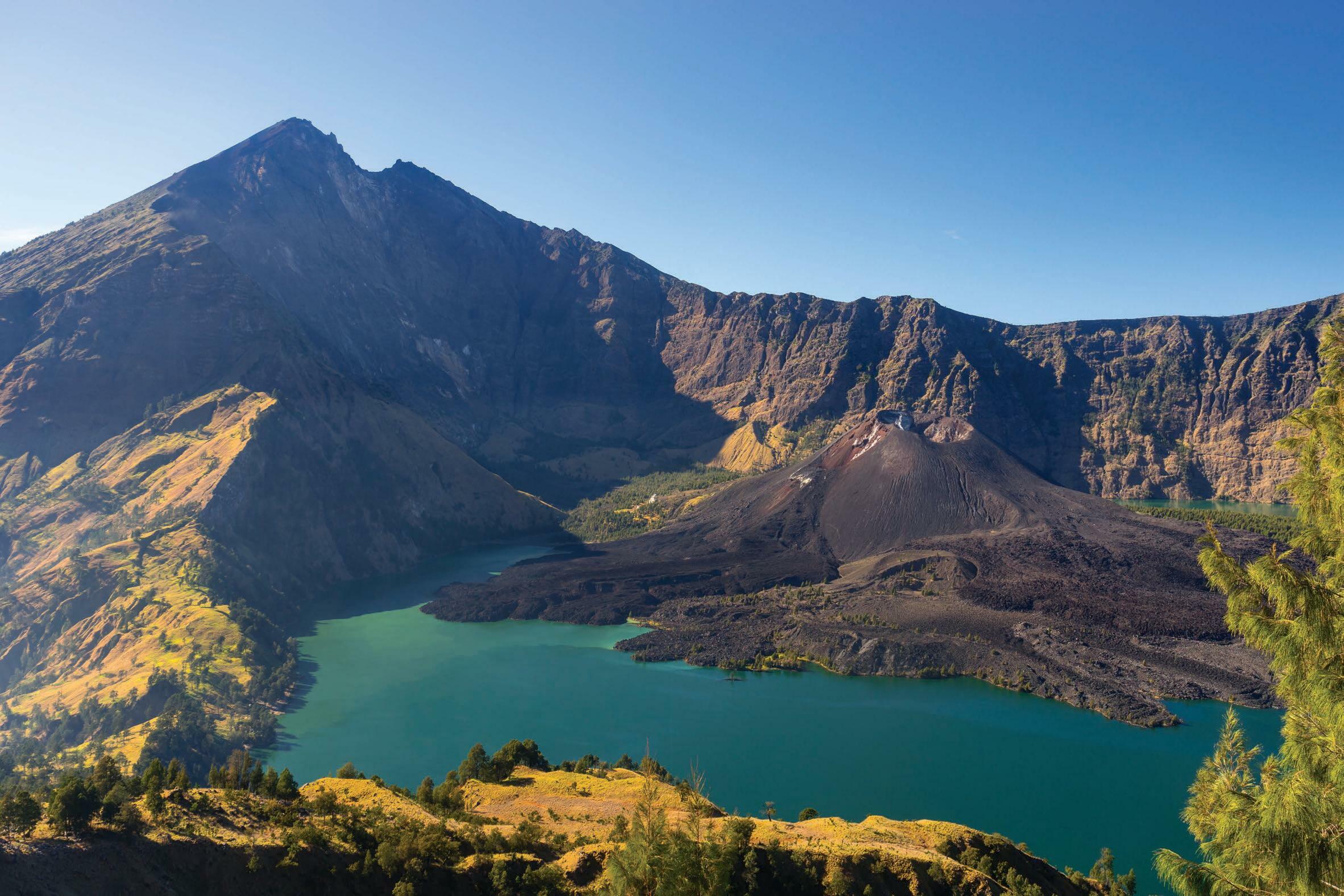Prøve GULL - Gratis
The Curious Case of the Missing Valcano
Muse Science Magazine for Kids
|October 2023
A MASSIVE VOLCANO CAN'T JUST VANISH. OR CAN IT?

Fiery volcanoes and the frigid polar regions seem poles apart. But concealed in the Arctic and Antarctic ice sheets are mementos-ash and sulfate particles-from past super-powerful volcanic eruptions. During such eruptions, volcanoes spew material dozens of miles into the sky. The swirling of winds disperses these chemicals and ash over continents, all the way to the poles. When snow falls there, the material is also deposited. In ice cores-cylinders of ice drilled from ice sheets-sulfate from past volcanic plumes shows up as spikes. Measuring how intense each spike is helps scientists figure out how strong each eruption was.
In the 1970s, polar scientists stumbled upon a sulfate spike that occurred in roughly 1259. Unlike others, though, this one was ginormous. It dwarfed the spike from the ear-splitting 1883 eruption of Mount Krakatoa in Indonesia. "The eruption was one of the largest of the last millennium," says Céline Vidal. She's a volcanologist-a scientist who studies volcanoes. She also lectures about geography at the University of Cambridge in England. "The amount of material erupted would have buried New York City under about eight feet (2.5 m) of rocks and ash."
Medieval European accounts also provided indirect evidence for an enormous eruption at around the same time. Severe hailstorms and floods plagued eastern England and parts of Europe in the winter of 1260 to 1261. From Iceland to Italy, ice layers crusted over seas and rivers.
There was just one problem: Nobody seemed to have reported seeing a volcano erupting. So, where was the missing volcano?

HOT INSIDE, COLD OUTSIDE
Denne historien er fra October 2023-utgaven av Muse Science Magazine for Kids.
Abonner på Magzter GOLD for å få tilgang til tusenvis av kuraterte premiumhistorier og over 9000 magasiner og aviser.
Allerede abonnent? Logg på
FLERE HISTORIER FRA Muse Science Magazine for Kids

Muse Science Magazine for Kids
ANIMAL FIREFIGHTER TO THE RESCUE
Can animals help manage the risks of deadly wildfires?
3 mins
Muse July 2025: The Story Behind Wildfires

Muse Science Magazine for Kids
FIRE DANGER
WHY THE RISK OF WILDFIRES KEEPS GROWING
4 mins
Muse July 2025: The Story Behind Wildfires

Muse Science Magazine for Kids
The Miller NEW Normal
WHAT TODAY’S WILDFIRES TELL US ABOUT OUR FUTURE
8 mins
Muse July 2025: The Story Behind Wildfires

Muse Science Magazine for Kids
WOMEN AND FIREFIGHTING: A GOOD FIT
Jessica Gardetto is a firefighter. Her father was, too. “I grew up with my dad coming home smelling like wildfire and covered in soot,” she says.
1 min
Muse July 2025: The Story Behind Wildfires

Muse Science Magazine for Kids
What is happening on your fingertips when they get all wrinkly in a hot tub?
—Felix G., age 10, Montana
1 mins
Muse July 2025: The Story Behind Wildfires

Muse Science Magazine for Kids
WHEN the SMOKE CLEARS
THE LINGERING EFFECTS OF THE RECENT PACIFIC PALISADES AND ALTADENA EATON FIRES
6 mins
Muse July 2025: The Story Behind Wildfires

Muse Science Magazine for Kids
PICKING TEAMS
Keep it fair with a strategy that relies on geometry.
2 mins
Muse July 2025: The Story Behind Wildfires

Muse Science Magazine for Kids
SHAN CAMMACK
WILDLIFE BIOLOGIST AND FIRE SAFETY OFFICER
3 mins
Muse July 2025: The Story Behind Wildfires

Muse Science Magazine for Kids
Scientists Create Mice With Woolly Mammoth-Like Fur
RESEARCHERS AT A COMPANY IN TEXAS ARE WORKING TO CREATE A LIVING ANIMAL THAT RESEMBLES THE EXTINCT WOOLLY MAMMOTH. Recently, they produced mice with traits of the large mammal. The mice all have coats with mammoth-like fur, and some of the small mammals also have genes that help them store fat. Both features would help the animals survive in the cold Arctic, where the woolly mammoth once lived.
1 min
Muse July 2025: The Story Behind Wildfires

Muse Science Magazine for Kids
Cool Sunshade Added to the Nancy Roman Space Telescope
THE NANCY ROMAN SPACE TELESCOPE IS A NEW TELESCOPE THAT NASA IS BUILDING AND WILL LAUNCH INTO SPACE, LIKELY IN EARLY 2027.
1 min
Muse July 2025: The Story Behind Wildfires
Translate
Change font size

